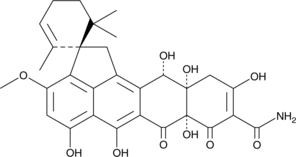Primary Eicosanoid HPLC Mixture
Primary Eicosanoid HPLC Mixture
This mixture contains the primary COX products produced by most mammalian tissues. Contents: Prostaglandin D2, Prostaglandin E2, 6-keto Prostaglandin F1?,...

Viridicatumtoxin in a mycotoxin originally isolated from Penicillium that has diverse biological activities, including antimicrobial, cytotoxic, and toxic properties.{36724,30257,36725} It inhibits the growth of B. subtilis, M. luteus, C. perfringens, B. fragilis, and methicillin-resistant S. aureus (MRSA; MICs = 0.39-1.56 µg/ml), as well as C. albicans, S. cerevisiae, M. racemosus, A. niger, and P. chrysogenum (MICs = 6.2-25 µg/ml), but has no activity against M. smegmatis, E. coli, K. pneumoniae, P. aeruginosa, or S. marcescens (MICs = >100 µg/ml).{36725} Viridicatumtoxin inhibits the production of polyprenyl alcohols by S. aureus undecaprenyl pyrophosphate (UPP) synthase, E. coli octaprenyl pyrophosphate synthase (OPS), and S. cerevisiae dehydrodolichyl pyrophosphate (DedoIPP) synthase in vitro (IC50s = 3.1, 21, and 71 µM, respectively). It has cytotoxic effects against human Jurkat T (IC50 = 4.92 µM), chronic lymphocytic leukemia (CLL; LC50 = 0.7-3.5 nM), and bone marrow-derived HS-5 stromal cells.{30257,36725} Viridicatumtoxin is toxic to rats and mice when administered intraperitoneally (LD50s = 80 and 90 mg/kg, respectively) and to rats when administered via gastric intubation (LD50 = 122.4 mg/kg), but not to rats or mice when administered orally or through subcutaneous injection.{36724,36726}
Territorial Availability: Available through Bertin Technologies only in France
Technical Warning: Bertin Technologies restricts the sale of this product to licensed controlled substance laboratories and qualified academic research institutions. Please contact us for further details.
Special Advice: Please check regulation status before ordering; additionel fees can apply.
| Size | 1 mg, 5 mg |
|---|---|
| Shipping | dry ice |
| CAS number | 39277-41-3 |
| Molecular formula | C30H31NO10 |
| Smiles | O[C@@H]1[C@]2(O)[C@](C(C(C(N)=O)=C(O)C2)=O)(O)C(C3=C(O)C4=C(O)C=C(OC)C5=C4C(C[C@]56C(C)(C)CCC=C6C)=C31)=O |
| Molecular weight | 565,6 |
| Custom code | 2907.19 |
| Formulation | A solid |
| Purity | ≥95% |
| UNSPSC code | 12352100 |
Cayman Chemical’s mission is to help make research possible by supplying scientists worldwide with the basic research tools necessary for advancing human and animal health. Our utmost commitment to healthcare researchers is to offer the highest quality products with an affordable pricing policy.
Our scientists are experts in the synthesis, purification, and characterization of biochemicals ranging from small drug-like heterocycles to complex biolipids, fatty acids, and many others. We are also highly skilled in all aspects of assay and antibody development, protein expression, crystallization, and structure determination.
Over the past thirty years, Cayman developed a deep knowledge base in lipid biochemistry, including research involving the arachidonic acid cascade, inositol phosphates, and cannabinoids. This knowledge enabled the production of reagents of exceptional quality for cancer, oxidative injury, epigenetics, neuroscience, inflammation, metabolism, and many additional lines of research.
Our organic and analytical chemists specialize in the rapid development of manufacturing processes and analytical methods to carry out clinical and commercial GMP-API production. Pre-clinical drug discovery efforts are currently underway in the areas of bone restoration and repair, muscular dystrophy, oncology, and inflammation. A separate group of Ph.D.-level scientists are dedicated to offering Hit-to-Lead Discovery and Profiling Services for epigenetic targets. Our knowledgeable chemists can be contracted to perform complete sample analysis for analytes measured by the majority of our assays. We also offer a wide range of analytical services using LC-MS/MS, HPLC, GC, and many other techniques.
Accreditations
ISO/IEC 17025:2005
ISO Guide 34:2009
Cayman is a leader in the field of emerging drugs of abuse, providing high-purity Schedule I-V Controlled Substances to federally-licensed laboratories and qualified academic research institutions for forensic analyses. We are certified by ACLASS Accreditation Services with dual accreditation to ISO/IEC 17025:2005 and ISO Guide 34:2009.
This mixture contains the primary COX products produced by most mammalian tissues. Contents: Prostaglandin D2, Prostaglandin E2, 6-keto Prostaglandin F1?,...
The cyclopentenone prostaglandin HPLC mixture contains all of the major UV-absorbing cyclopentenone prostaglandins and their precursors supplied in methyl acetate....
This mixture contains primary prostaglandins produced from arachidonic acid and dihomo-?-linolenic acid. Contents: Prostaglandin E1, Prostaglandin E2, Prostaglandin F1?, 6-keto...
Inositol hexakisphosphate kinase 2 (IP6K2) is a cytoplasmic kinase that catalyzes the conversion of IP6 to diphosphoinositol pentakisphosphate in the...
TAF10 is one of many protein factors or coactivators associated with RNA polymerase II activity.{16903} One vial of this peptide...
This mixture contains the characteristic metabolites of both PGI2 and TXA2. Contents: Thromboxane B2, 11-dehydro Thromboxane B2, 6-keto Prostaglandin F1?,...
Prostaglandin I synthase (PGIS) catalyzes the isomerization of PGH2 to PGI2. PGI2 (prostacyclin) is a potent vasodilator and inhibitor of...
To be used in conjunction with Cayman’s NAPE-PLD polyclonal antibody (aa 6-20) (Item No. 10306) to block protein-antibody complex formation...
This mixture contains the primary metabolites of prostaglandins (PGs) D2, E2, and F2?. Contents: 13,14-dihydro-15-keto PGD2, 13,14-dihydro-15-keto PGE2, 11?-PGF2?, 13,14-dihydro-15-keto...
Amyloid-? (1-8, A2V) is a truncated form of amyloid-? (A?) that contains a valine to alanine substitution at position 2...
Protein phosphorylation is an important post-translational modification that serves many key functions to regulate a protein’s activity, localization, and protein-protein...
Platelet-activating factor (PAF) is an important lipid mediator involved in inflammation. PAF-acetylhydrolase (PAF-AH) is an extracellular phospholipase A2 which hydrolyzes...
Proprotein convertase subtilisin kexin 9 (PCSK9) is a member of the subtilisin serine protease family with an important role in...
Histone H2A is a core histone that forms a dimer with histone H2B.{46631} Two histone H2A/H2B dimers form an octameric...
Sirtuin 5 (SIRT5) is an enzyme that catalyzes the NAD-dependent removal of malonyl, succinyl, and glutaryl groups from target proteins.{55107,55108}...
GST-tag Polyclonal Antibody (FITC) is a probe for the immunochemical detection of GST tags on recombinant proteins. Recombinant proteins are...
To be used in conjunction with Cayman’s FABP3 polyclonal antibody (Catalog No. 10233) to block protein-antibody complex formation during immunochemical...
The Cayman COX Inhibitor Pack contains a combination of frequently used cyclooxygenase (COX) inhibitors. Each kit contains aspirin, the archetype...
Headquarters:
Parc d’activités du Pas du Lac
10 bis avenue Ampère
78180 Montigny le Bretonneux
France
Copyright © 2024 BERTIN BIOREAGENT. All rights reserved | Terms & conditions



